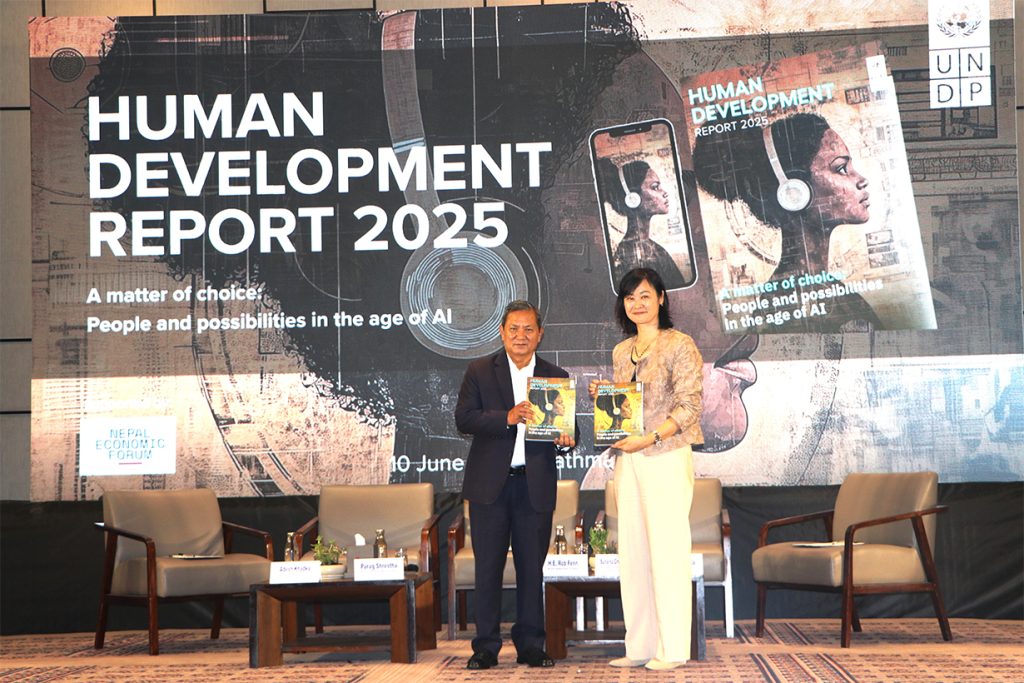
According to the Human Development Index 2025 published by the United Nations Development Programme (UNDP), Nepal has improved by one position compared to the previous year.
Last year, Nepal was ranked 146th out of 193 countries. This year, the ranking has slightly improved to 145th.
This year, Nepal’s Human Development Index (HDI) also showed a slight improvement. Last year, Nepal’s HDI was 0.605, which has increased to 0.622 this year.
Nepal has consistently remained in the medium human development category. Compared to 2015, Nepal has improved by five positions in the HDI ranking.
54% Increase in HDI Over the Last 35 Years
The report highlights that Nepal’s HDI has increased by 54 percent over the past 35 years.
Low per capita income and persistent gender inequality are cited as the primary reasons for Nepal’s relatively poor performance on the Human Development Index (HDI).
South Asia Rankings in HDI 2025
-
Sri Lanka is ranked highest in South Asia at 89th
-
Maldives follows at 93rd
-
Bhutan ranks 125th
-
India and Bangladesh are both in the 130th position
-
Nepal stands at 145th
-
Pakistan is ranked the lowest in the region at 168th
Focus on AI's Impact on Multidimensional Human Development
This year’s report focuses on the theme of how Artificial Intelligence (AI) can impact various aspects of human development and the possibilities it presents.
The report highlights the potential of AI to enhance human development, promote inclusiveness, and support the establishment of a just society.
Nepal Prioritizes IT Development, Says Minister Gurung
At the report's public release event, Minister for Communication and Information Technology, Mr. Prithvi Subba Gurung, stated that Nepal has prioritized the development of the Information Technology (IT) sector.
He mentioned that policy-level initiatives are being advanced to promote Artificial Intelligence (AI), establish data centers, expand the digital economy, and attract foreign direct investment.
Minister Gurung further noted that policies are in place to increase the use of AI in research and development. Studies are also underway to explore how AI can be effectively utilized in education, healthcare, and agriculture to enhance productivity and make public service delivery in Nepal globally competitive.
Nepal Positioned as a Natural Fit for Data Centers
Minister Gurung also emphasized that Nepal is naturally suitable for establishing data centers. He stated that the government aims to make data centers a foundation of the digital economy.
Nepal’s cool climate in the Himalayan region, combined with the availability of affordable green energy (hydropower), makes it an attractive destination for data center development, according to the Minister.
Encouraging Foreign Investment in Nepal’s IT Sector
“The government has adopted a policy to promote IT-based entrepreneurship and increase private investment in technology,” said Minister Gurung. “We also believe that by encouraging foreign companies to invest in Nepal's IT sector, we can help create jobs and support technology transfer.”
He added that the government is working to establish IT hubs in each province and is taking steps to develop necessary infrastructure for that purpose.
Enhancing the Digital Nepal Framework
The Minister also shared that the existing ‘Digital Nepal Framework’ will be further refined and implemented in an organized manner.
Through this initiative, the government aims to improve service digitization, enhance e-governance, and increase citizens’ digital access.
UNDP Representative Highlights Opportunities and Challenges of AI
UNDP Nepal’s Resident Representative, Kyoko Yokosuka, explained that the report focuses on how the use of Artificial Intelligence can be beneficial and what challenges it might pose.
In the context of Nepal, she highlighted that AI could be effectively utilized in areas such as inclusive service delivery, enhancing the capacity of local governments, disaster management, climate change mitigation, and evidence-based policymaking.
Communication Secretary Aryal Outlines Policy Priorities
At the same event, Secretary of the Ministry of Communication and Information Technology, Radhika Aryal, stated that various reform efforts are ongoing in the field of information technology.
“Digital Nepal Framework, the National Information Technology Policy, and telecommunication-related laws need to be updated,” Aryal said. “Likewise, legal and technical infrastructure for cybersecurity and Artificial Intelligence are also among our policy priorities.”
She further added that the government is focusing on building core digital infrastructure, including the development of data centers at various locations and an integrated e-governance system.


